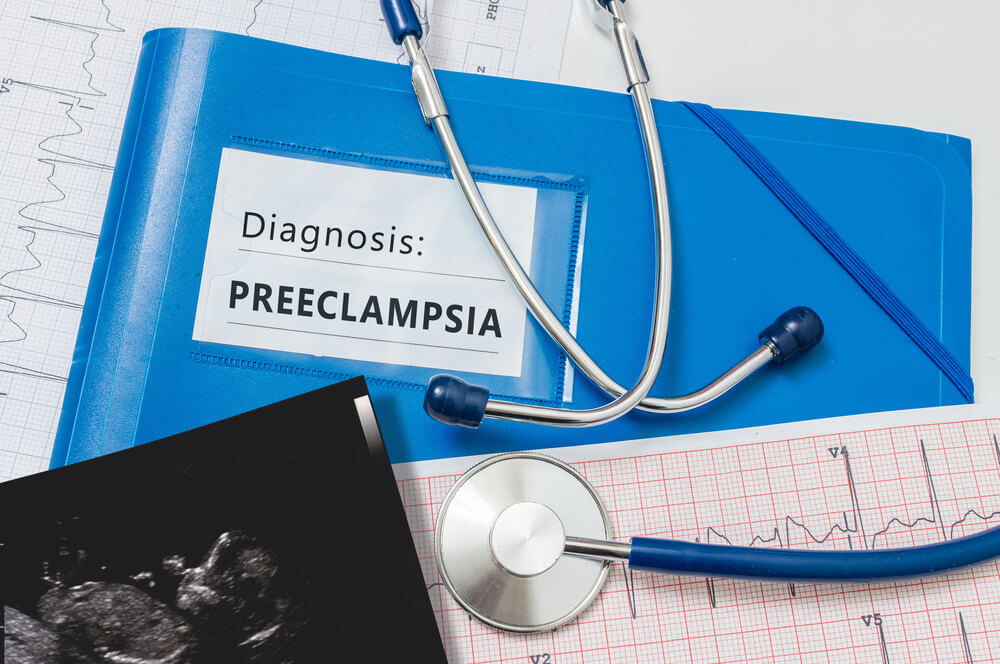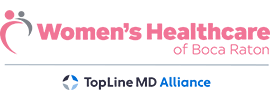Disclaimer: Please note that this blog is for educational purposes only, it includes general information on health-related topics. Women’s Healthcare of Boca Raton is giving medical advice to Patients Only. Follow this link to request an appointment with Dr. Ellman.
In simple terms, preeclampsia is a complication that may arise during pregnancy that usually begins after the 20th week of pregnancy in previously healthy women with no blood pressure issues.
Preeclampsia symptoms may include elevated blood pressure (without previous issues with hypertension) and high protein concentrations in the urine, which may signal organ damage like kidney issues (proteinuria).
Needless to say, if women ignore the signs of preeclampsia, it may lead to severe consequences, and as such, visiting a reputable obstetric specialist in Boca Raton is highly advised if you are in the area and have concerns about pregnancy preeclampsia.
In this article, we’ll aim to cover everything there’s to know about the condition and highlight the steps women can take to prevent preeclampsia from occurring.
Preeclampsia Symptoms
As said before, hypertension and proteinuria are the two most common signs of the condition, but unfortunately, there are cases when women don’t produce any noticeable symptoms. Furthermore, medical experts often diagnose preeclampsia during routine visits.
On the other hand, there are other signs of preeclampsia that patients may overlook or won’t notice without necessary tests:
- Severe headaches
- An increase in liver enzymes indicates liver issues
- Thrombocytopenia or a decrease in blood platelet levels
- Vision changes like blurred vision or temporary vision loss
- Shortness of breath
- Upper belly pain, under on the right side, under the ribs
- Feeling nauseous or vomiting
Swelling and weight gain are also expected during even healthy pregnancies. Still, suppose the swelling or the weight gain happens seemingly overnight (mainly when the hands and the face are swelling). In that case, patients should be concerned about preeclampsia and should reach out to their healthcare provider as soon as possible.
Because of the nature of the condition, regular prenatal visits are pivotal to ensure that experts monitor your blood pressure and look for any sudden changes or signs of preeclampsia.
Furthermore, if you are experiencing vision problems, severe headaches, shortness of breath, and belly pain, you should visit your doctor or go to an emergency room as soon as possible.
Also, nausea, different aches and pains, and headaches can be pretty common during pregnancy; make sure to reach out to your doctor if you are concerned and schedule regular prenatal visits.
Causes

Pregnancy preeclampsia may have several trigger factors, and experts believe the condition may begin in the placenta. More specifically, the blood vessels that deliver in early pregnancy to deliver oxygen and nutrients to the placenta fail to develop and work properly in the case of preeclampsia, and the problems with blood circulation in the placenta may lead to blood pressure problems in the mother.
Other Disorders High Blood Pressure Pregnancy Disorders
Unfortunately, preeclampsia isn’t the only hypertension disorder that may occur when a woman’s pregnant.
Others include:
Gestational hypertension: begins in after the 20th week but without kidney problems. Some women may also develop preeclampsia if they have gestational hypertension.
Chronic Hypertension: This can present itself before the 20th week of pregnancy and may last even after pregnancy.
Chronic Hypertension with Superimposed Preeclampsia: This happens when a pregnant woman with chronic hypertension develops preeclampsia.
Risk Factors
There are a few risk factors that may increase the risk of developing the condition, and they are:
- Having to deal with preeclampsia in previous pregnancies
- Being pregnant with two or more babies
- Chronic hypertension
- Having type 1 or 2 diabetes before becoming pregnant
- Autoimmune disorders
- Kidney disease
- In vitro fertilization
On the other hand, the following may moderately increase the risk of developing preeclampsia:
- First pregnancy with your current partner
- Being obese
- Having a family history of the condition
- If you are 35 or older
- Had complications during your previous pregnancy
- More than ten years have passed since you’ve been pregnant previously
Possible Complications
When noticing the signs of preeclampsia, patients shouldn’t avoid getting medical assistance, as the condition may lead to the following complications:
- Preterm birth: When the mother has preeclampsia, she may deliver the baby before 37 weeks. Babies born prematurely might face breathing difficulties, hearing and vision problems, cerebral palsy, and developmental delays. Fortunately, certain treatments before preterm delivery may help decrease some risks.
- Fetal growth restriction: As the condition affects the arteries that supply blood to the placenta, the baby may fail to receive enough oxygen, blood, and fewer nutrients. In turn, this can lead to slow fetal development.
- HELLP syndrome: This stands for hemolysis or red blood cell destruction, elevated enzymes in the liver, and a low platelet count. This counts as a severe, progressed form of preeclampsia that affects several organ functions that may cause lifelong problems to the pregnant woman. Symptoms of this preeclampsia progression may show as upper right belly pain, headaches, vomiting, and nausea. The condition may develop with a sudden onset, even before patients can detect hypertension.
- Organ damage: If left untreated, the condition can cause damage to the liver, eyes, heart, lungs, and kidneys and may even lead to a stroke.
- Placental abruption: The signs of preeclampsia may also be the risk of the abruption of the placenta. This occurs when the placenta separates from the inner uterine wall before baby delivery. The abruption can lead to profuse bleeding and may be life-threatening both for the baby and the mom.
- Eclampsia: This condition manifests in the onset of seizures and comes along with the symptoms of preeclampsia. The first can happen without any obvious signs of preeclampsia and may have the following warning signs: severe headaches, mental confusion, vision problems, and altered mental behaviors. Unfortunately, it’s difficult to predict whether eclampsia will develop alongside preeclampsia or not.
- Cardiovascular problems: Having the condition during pregnancy may result in the future blood vessel and heart problems. Those who had to deal with preeclampsia more than once and had preterm deliveries are at even greater risk.
Treatment
Often, early delivery is the advised treatment option. Timing the delivery is of key importance and will often depend on how many weeks pregnant the mother is and the severity of her condition. However, before the doctors opt for early delivery, they also do their best to treat preeclampsia through medications to manage any complications and to lower blood pressure, along with carefully monitoring the state of the expecting mother.
Preventing Preeclampsia

Clinical evidence supports that the best way to prevent preeclampsia is by using low-dose aspirin. Make sure to talk to your primary care provider beforehand, and they may advise taking 81 milligrams of aspirin every day after the 12th week of your pregnancy if you have at least one high-risk factor present or more than one moderate-risk factor.
Again, it’s paramount to talk to your doctor before taking any medication, supplements, or vitamins. They will be able to tell whether using them will be safe for you during the pregnancy.
Make Healthy Choices
Before becoming pregnant, make sure to live as healthy as you can. This is especially important if you had to deal with preeclampsia during past pregnancies. Talk to your healthcare provider regarding healthy lifestyle choices and ask them to tell you more about managing any conditions that can potentially increase the risk of developing preeclampsia.
To that end, to learn more about healthy pregnancies, feel free to reach out to our experts for more advice.

Dr. Ellman is a Board Certified OBGYN who established his medical practice in South Florida over 25 years ago. His office, Women’s Healthcare of Boca Raton, is located in Boca Raton, Florida at West Boca Medical Center. Dr. Ellman attended Albert Einstein College of Medicine of Yeshiva University, where he received his medical degree. He went on to intern at Beth Israel Hospital in Boston- an affiliate of Harvard Medical School- and continued his residency at North Shore University Hospital in Manhasset, New York- an affiliate of Cornell Medical School.
Dr. Ellman has practiced Obstetrics and Gynecology in the Boca Raton area since 1995. In addition to treating patients at West Boca Hospital, Dr. Ellman also treats patients through his own private practice, Women’s Healthcare of Boca Raton, located on the West Boca Medical Campus.

